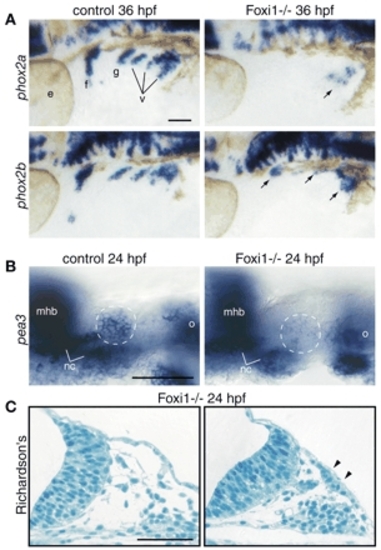
Foxi1 mediates Fgf response in the EB placodes. foxi1 mutant embryos and their wild-type sibs were processed for in-situ hybridization with phox2a and phox2b (A), pea3 (B) and modified Richardson's stain (C). All whole-mount panels show lateral views. Anterior is left. (A) When compared with their wild-type sibs (left), phox2a expression is absent in the facial, glossopharyngeal and small vagal ganglia, while it is significantly reduced in the large vagal ganglion (arrow) in the foxi1 mutants (right). By contrast, phox2b is still expressed in all EB ganglia, albeit at lower levels (arrows). (B) Optical sections through the facial placode (presumptive facial placode is outlined by a dashed circle). Note significant reduction of pea3 expression in the facial placode of the foxi1 mutant embryo (right), while other pea3 expression domains are unaffected. (C) Histological analysis of the transverse sections through the head region revealed the presence of columnar epithelium (marked by arrowheads; compare with the ectoderm immediately proximal to the facial placode, left panel), indicating presence of placodes in the foxi1 mutants. Scale bars: 50 µm. mhb, midhindbrain boundary; nc, chondrogenic neural crest of the first and second arches; o, otic vesicle. Other abbreviations are as in Fig. 1.
|

